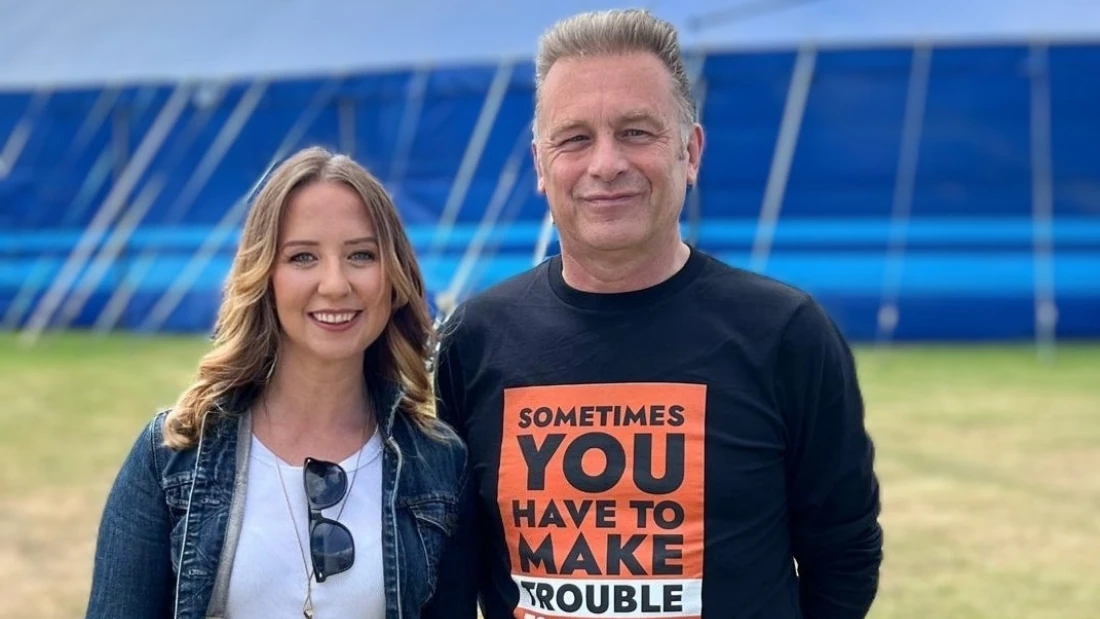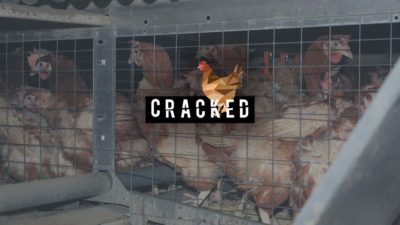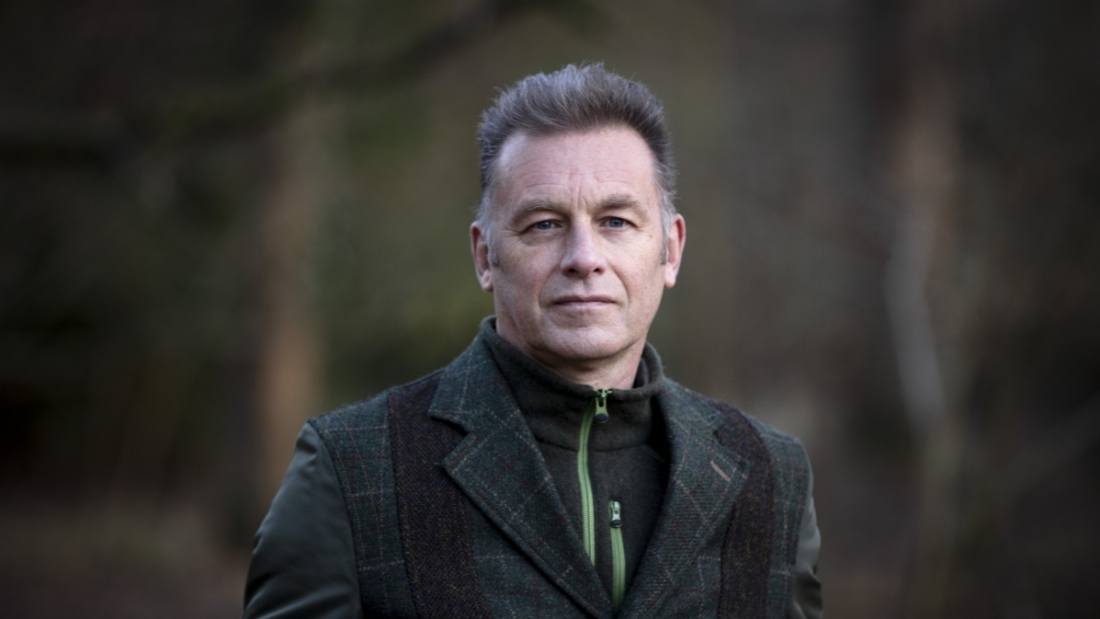Chris Packham: Angry, Hopeful, and Tired of Waiting for Action

Chris Packham isn’t someone to mince his words, and right now, he’s angrier than ever. For years, he’s been a relentless voice of frustration, broadcasting his fury at the unchecked environmental destruction and the government’s lack of meaningful action. His outrage is constant, like a lighthouse shining a warning beam on an indifferent sea, but now, there’s a sense that his patience is wearing thin. I had the chance to chat with him at Vegan Camp Out 2024.
“I still fear that the NFU has a stranglehold over DEFRA,” he tells me, his intensity palpable. Packham believes the National Farmers’ Union represents powerful industrial farming interests driving much of the UK’s environmental decline, and DEFRA, the Government’s environmental arm, is too weak to push back. “We’re WhatsApping them, calling them, trying to keep the doors open, but will they listen? Probably not,” he admits. The urgency in his voice is clear: the clock is ticking and the stakes have never been higher.
If you’ve ever seen Chris Packham on TV, you’ll know he radiates the sort of fury usually reserved for someone who’s just discovered their lawn has been sprayed with weed killer – while they were standing on it. He’s the environmentalist’s environmentalist, and he’s absolutely done with half measures.
“We’ve got the tools. We know rewilding works, we know how to rebuild habitats, but we’re constantly thwarted. DEFRA and the NFU have a complete grip on what happens to our landscapes, and we’re still sitting here talking about ‘reintroducing’ beavers like it’s some madcap experiment. It’s not. It’s been tried and tested, and yet we’re still farting around with bureaucracy. It’s pathetic.”
He speaks in rapid-fire bursts, as if the act of getting the words out might slow him down. He’s spent decades advocating for nature and is exhausted by how slowly the political machine grinds. “Every year, the State of Nature reports get published. Every four years, they tell us that we’re going to hell in a handcart. One in six species is endangered, 70 per cent of insects have vanished in the last 20 years. What are we doing? Tinkering around the edges! Putting up bird boxes like that’s going to stop a crisis.”
It’s clear that Packham feels like the UK’s conservation efforts are, in his words, “a mess”. The statistics back him up: the UK is one of the most nature-depleted countries in the world. But while the rest of us have just been swallowing the apocalyptic news updates and sighing into our oat milk, Packham’s been steadily ramping up his activism, and he’s fed up with the cautious approaches of mainstream environmental groups.
“We’ve got to stop being afraid. We’ve been too polite for too long, tinkering around in our nature reserves while the rest of the country’s turned into one vast monoculture. We’re not just up against the bad guys; we’re up against ourselves. The NGOs, the conservation groups – they need to grow a backbone. If they don’t want to take on the big fights, then someone has to. And by ‘big fights’, I mean farming policy, the oil industry and all those corporate interests hell-bent on wrecking the planet for a quick buck.”
It’s a loaded question, but I have to ask what Chris thinks about the power of think tank lobbyists, such as Tuffnel Street. Not surprisingly, his distaste for political lobbying is as fervent as his environmental campaigning. “Lobbyists are a cancer on our political system,” he says bluntly, leaning forward as if about to deliver a knockout punch. “They’re whispering in the ears of politicians at all hours, ensuring that the interests of big corporations outweigh the needs of the planet every single time. It’s obscene. We need to ban lobbyists outright.” And on the infamous ‘Tuffnell Street brigade’, a group of power players and corporate lobbyists who haunt Westminster’s back rooms, pulling strings while the rest of us get fed crumbs, he says: “They don’t give a toss about the environment or future generations – they care about short-term profits, and they’re making sure we remain hooked on fossil fuels, industrial farming and pointless vanity projects. If we’re serious about change, we need to get these people out of politics.” For Packham, Tuffnell Street isn’t just a road; it’s a symbol of how deep the rot goes in British democracy.
Which brings us neatly into the arena of protest. “It’s absolutely appalling, these draconian prison sentences for climate activists. Five years for peacefully protesting? Where the hell are we? People hate Just Stop Oil, but guess what? The laws they’ve brought in aren’t just for climate activists – they’re for anyone who wants to stand up against injustice. You don’t like Just Stop Oil? Fine. But when you want to go on strike for your wages or protest for your rights, don’t be surprised when they chuck you in a cell and throw away the key. People aren’t seeing the bigger picture. It’s frightening.”
But while Packham’s frustrations are clear, so too is his hope that something might change. He’s not a complete nihilist. After all, he’s still here, still talking to journalists, still standing in the rain at protests. “We need an explosion of activism like we’ve seen with Black Lives Matter or the Me Too movement. For years, gender inequality and racism were ‘tolerated’ until they weren’t. The same needs to happen with biodiversity loss, animal welfare, climate change – these issues are intertwined. The tipping point is coming. I just hope it’s not too late.”
And if anyone is going to push that tipping point, Packham reckons it’ll be the younger generation. “I’m so sick of hearing politicians say they’re “listening to young people”. Well, stop bloody listening and let them do something! They see things clearly, they aren’t encumbered by the bullshit politics of life, and they aren’t afraid of making mistakes. We need that kind of energy right now. We need people who aren’t scared to push the button on the rocket.”
He laughs, only half-joking, before launching into his vision of an ideal future where young people are in charge. “Honestly, there should be a maximum age for decision-makers. They need to be younger than me for sure. 25 to 35, maybe. Look at the Apollo moon landing. The average age of the people in Mission Control was 25. They weren’t scared to take risks. If they were 55, we’d still be waiting for them to push the bloody button!”
There’s a lightness to his tone, but beneath it is the very real frustration of a man who’s spent decades banging his head against the political brick wall. His criticisms of government extend beyond the environment into policy failures and the growing sense of authoritarianism he feels is creeping into UK law. Yet, even as the machinery of governance grinds on at its usual sluggish pace, Packham is relentless in his campaigning.
There are personal fights he won’t let go of, like fur and fox hunting. “I’ve always despised the fur industry. Labour’s got a ban on fur imports in their manifesto and we need to hold them to that. We banned fur farms in the 90s, but we’re still importing fur from countries where conditions are horrific. It’s madness! It just doesn’t compute.” And then there’s fox hunting, another thorn in his side. “They’ve got trail hunting in their sights. Good. Let’s shut it down. It’s barbaric. It’s over. Time to put it to bed.”
But for Packham, the big fight – the one that’s been gnawing away at him for years – is farming. “Eighty-six per cent of this country is farmland, and much of it is poorly managed. We’ve got to take on farming policy. It’s the elephant in the room. There are farmers doing incredible, sustainable work, but industrial agriculture is killing our biodiversity. It’s out of control.”
And if there’s one symbol of that destruction, it’s the chicken farms that dot the British landscape. “Chicken farms on the River Wye are a perfect example. They’re feeding chickens soy that’s grown on deforested land in the Amazon, so we’re not only destroying the rainforest, but we’re also poisoning our rivers with the runoff. It’s the perfect storm of destruction. And yet, every time someone buys a cheap chicken, they’re part of the problem. People need to connect the dots. It’s all connected.”
This is where Packham’s fire comes through strongest. He’s done with nibbling at the edges, placating the powers that be with polite lobbying and backroom meetings. The stakes are higher than ever, and for Packham, it’s time to act. “We’ve been given five years by climate scientists to get our act together. We don’t have a choice. The time for tiptoeing around is over.”
Packham’s message is clear: if the politicians won’t take on the big fights, then the people – and that means us – need to.








